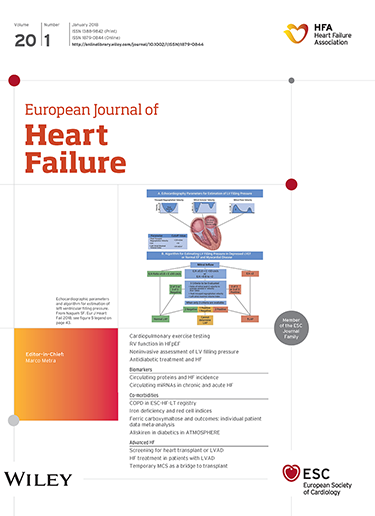Global Registries and Surveys Programme-Heart Failure (GRASP-HF): Rationale, study design and research implications.
IF 10.8
1区 医学
Q1 CARDIAC & CARDIOVASCULAR SYSTEMS
引用次数: 0
Abstract
Heart failure (HF) is characterized by increasing prevalence, high morbidity and mortality, poor quality of life, and substantial healthcare costs. Despite advancements in pharmacologic and device-based therapies, translating evidence from randomized controlled trials into clinical practice remains suboptimal. The Global Registries and Surveys Programme-Heart Failure (GRASP-HF) is a pan-European, snapshot, observational study, aiming at assessing the real-world implementation of evidence-based HF management. GRASP-HF captures both acute and chronic HF presentations to assess the adherence to the 2021 and 2023 European Society of Cardiology (ESC) HF Guidelines. It also serves as a platform for the accreditation of HF centres for the Improving Care through Accreditation and Recognition in Heart Failure (ICARe-HF) programme. This manuscript outlines the rationale, methodology, and design of GRASP-HF. Unlike previous registries, GRASP-HF ensures that all patients are consecutively enrolled over a pre-defined 2-month period, minimizing selection bias. GRASP-HF offers a real-time perspective on diagnostic strategies, use of guideline-recommended medical therapy and implementation of quality-of-care indicators. In addition, GRASP-HF addresses less explored domains by other registries, such as frailty, rare aetiologies (e.g. amyloidosis, genetic cardiomyopathies, Takotsubo syndrome), as well as non-fatal events during hospitalization and follow-up. GRASP-HF is also designed to inform ESC educational strategies and to benchmark progresses in HF care across European and non-European centres. In conjunction with ICARe-HF, annual repetition of GRASP-HF aims to facilitate continuous feedback between evidence, practice, and quality improvement. GRASP-HF will assist National Cardiac Societies in shaping national and institutional policies and will contribute with data-driven insights to future guideline development.全球登记和调查计划-心力衰竭(GRASP-HF):基本原理,研究设计和研究意义。
心力衰竭(HF)的特点是患病率上升,发病率和死亡率高,生活质量差,医疗费用高。尽管在药理学和器械治疗方面取得了进步,但将随机对照试验的证据转化为临床实践仍然不够理想。全球心力衰竭登记和调查项目(GRASP-HF)是一项泛欧、快照、观察性研究,旨在评估基于证据的心力衰竭管理在现实世界中的实施情况。grip -HF捕获急性和慢性HF表现,以评估对2021年和2023年欧洲心脏病学会(ESC) HF指南的依从性。它还作为心衰中心认证的平台,通过心衰认证和认可改善护理(ICARe-HF)计划。本文概述了GRASP-HF的基本原理、方法和设计。与以前的注册不同,grip - hf确保所有患者在预定义的2个月期间连续入组,最大限度地减少选择偏倚。GRASP-HF提供了诊断策略、使用指南推荐的药物治疗和实施护理质量指标的实时视角。此外,GRASP-HF还涉及其他登记处较少探索的领域,如虚弱,罕见病因(如淀粉样变性,遗传性心肌病,Takotsubo综合征),以及住院和随访期间的非致命事件。GRASP-HF还旨在为ESC教育策略提供信息,并在欧洲和非欧洲中心对心衰护理的进展进行基准测试。结合ICARe-HF, GRASP-HF的年度重复旨在促进证据、实践和质量改进之间的持续反馈。GRASP-HF将协助国家心脏协会制定国家和机构政策,并将为未来指南的制定提供数据驱动的见解。
本文章由计算机程序翻译,如有差异,请以英文原文为准。
求助全文
约1分钟内获得全文
求助全文
来源期刊

European Journal of Heart Failure
医学-心血管系统
CiteScore
27.30
自引率
11.50%
发文量
365
审稿时长
1 months
期刊介绍:
European Journal of Heart Failure is an international journal dedicated to advancing knowledge in the field of heart failure management. The journal publishes reviews and editorials aimed at improving understanding, prevention, investigation, and treatment of heart failure. It covers various disciplines such as molecular and cellular biology, pathology, physiology, electrophysiology, pharmacology, clinical sciences, social sciences, and population sciences. The journal welcomes submissions of manuscripts on basic, clinical, and population sciences, as well as original contributions on nursing, care of the elderly, primary care, health economics, and other related specialist fields. It is published monthly and has a readership that includes cardiologists, emergency room physicians, intensivists, internists, general physicians, cardiac nurses, diabetologists, epidemiologists, basic scientists focusing on cardiovascular research, and those working in rehabilitation. The journal is abstracted and indexed in various databases such as Academic Search, Embase, MEDLINE/PubMed, and Science Citation Index.
 求助内容:
求助内容: 应助结果提醒方式:
应助结果提醒方式:


